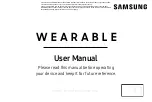
appears on your device. Approximately five hours of battery life
remain.
Improving Foot Pod Calibration
Before you can calibrate your device, you must acquire GPS
signals and pair your device with the foot pod (
).
The foot pod is self-calibrating, but you can improve the
accuracy of the speed and distance data with a few outdoor runs
using GPS.
1
Stand outside for 5 minutes with a clear view of the sky.
2
Start a running activity.
3
Run on a track without stopping for 10 minutes.
4
Stop your activity, and save it.
Based on the recorded data, the foot pod calibration value
changes, if necessary. You should not need to calibrate the
foot pod again unless your running style changes.
Calibrating Your Foot Pod Manually
Before you can calibrate your device, you must pair your device
with the foot pod sensor (
).
Manual calibration is recommended if you know your calibration
factor. If you have calibrated a foot pod with another Garmin
product, you may know your calibration factor.
1
Hold
UP
.
2
Select
Settings
>
Sensors
.
3
Select your foot pod.
4
Select
Cal. Factor
>
Set Value
.
5
Adjust the calibration factor:
• Increase the calibration factor if your distance is too low.
• Decrease the calibration factor if your distance is too high.
Setting Foot Pod Speed and Distance
Before you can customize the foot pod speed and distance, you
must pair your device with the foot pod sensor (
).
You can set your device to calculate pace and distance from
your foot pod data instead of GPS data.
1
Hold
UP
.
2
Select
Settings
>
Sensors
.
3
Select your foot pod.
4
Select
Speed
.
5
Select an option:
• Select
Indoor
when you are training with GPS turned off,
usually indoors.
• Select
Always
to use your foot pod data regardless of the
GPS setting.
tempe
The tempe is an ANT+ wireless temperature sensor. You can
attach the sensor to a secure strap or loop where it is exposed
to ambient air, and therefore, provides a consistent source of
accurate temperature data. You must pair the tempe with your
device to display temperature data from the tempe.
Device Information
Contacting Garmin Aviation Product Support
• Go to
for in-country support
information.
• In the Americas, call (866) 739-5687.
• In Europe, Africa, and the Middle East, call
+44 (0) 37 0850 1243.
• In Asia Pacific and Australia, call +65 6348 0378.
Viewing Device Information
You can view the unit ID, software version, regulatory
information, and license agreement.
1
Hold
UP
.
2
Select
Settings
>
System
>
About
.
Specifications
Battery type
Rechargeable, built-in lithium-ion battery
Battery life
Up to 6 wk.
Water rating
10 ATM*
Operating temperature
range
From -20º to 55ºC (from -4º to 131ºF)
Charging temperature
range
From 0º to 45ºC (from 32º to 113ºF)
Radio frequency
2.4 GHz
Radio protocols
ANT+ wireless technology, Wi
‑
Fi, Bluetooth
Smart device
*The device withstands pressure equivalent to a depth of 100 m.
.
Battery Information
The actual battery life depends on the features enabled on your
device, such as activity tracking, smartphone notifications, GPS,
internal sensors, and connected ANT+ sensors.
Battery Life Mode
Up to 20 hr.
Normal GPS mode
Up to 50 hr.
UltraTrac GPS mode with two-minute polling interval
Up to 6 wk.
Watch mode
HRM-Run Specifications
Battery type
User-replaceable CR2032, 3 V
Battery life
1 yr. (approximately 1 hr./day)
Operating temperature
range
From -10° to 50°C (from 14° to 122°F)
Radio frequency/protocol
2.4 GHz ANT+ wireless communications
protocol
Water rating
5 ATM*
*The device withstands pressure equivalent to a depth of 50 m.
.
Data Management
NOTE:
The device is not compatible with Windows
®
95, 98, Me,
Windows NT
®
, and Mac
®
OS 10.3 and earlier.
Disconnecting the USB Cable
If your device is connected to your computer as a removable
drive or volume, you must safely disconnect your device from
your computer to avoid data loss. If your device is connected to
your Windows computer as a portable device, it is not necessary
to safely disconnect.
1
Complete an action:
• For Windows computers, select the
Safely Remove
Hardware
icon in the system tray, and select your device.
• For Mac computers, drag the volume icon to the trash.
2
Disconnect the cable from your computer.
Deleting Files
NOTICE
If you do not know the purpose of a file, do not delete it. Your
device memory contains important system files that should not
be deleted.
Device Information
23










































